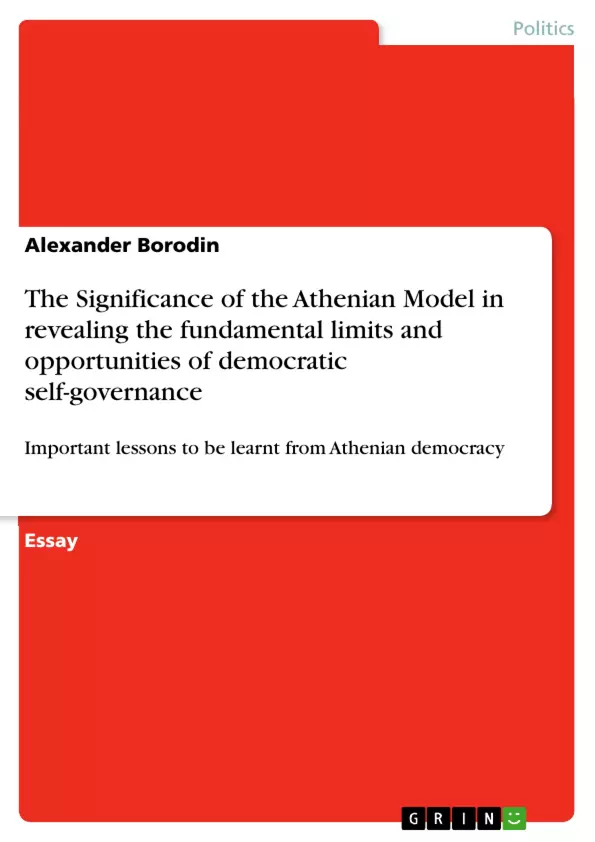In many ways Athenian assembly democracy constitutes a genuine as well as extreme model in democratic thought. This has to do on the one hand with its remarkable institutional features and on the other hand with its extensive practices of public participation. In what will follow, we should therefore at first look at the structure and the interrelations of the key organs of the Athenian system as a form of government. Our understanding of the mechanisms of these institutions will serve us as a basis to enquire critically into their actual performance as well as their significance for Athenian democracy as a whole. Investigating the principles behind the institutions such as selection by lot, very short periods of office or reliance on public opinion will then allow us to reflect on their implications for modern discourse on democratic ideas. It is my intention to illustrate how the Athenian system and particularly the broad public deliberation it relied on, exemplifies the necessary criteria which have to be achieved in order to strengthen rather than to undermine democracy. Whereas the Athenian model needs to be limited in some respects, for instance to avoid violations of the rule of law, it has to be furthered in other respects such as the enlightenment of the wide public.
Inhaltsverzeichnis (Table of Contents)
- The Significance of the Athenian Model
- Athenian Assembly Democracy
- The “Demos”
- The Council of 500
- The People's Law Courts
- The Assembly
- Limits of Athenian Democracy
- Effective Participation
Zielsetzung und Themenschwerpunkte (Objectives and Key Themes)
This text explores the Athenian model of democracy, examining its structure, mechanisms, and performance. The goal is to understand the Athenian system's positive and negative aspects, and to critically analyze its significance for modern democratic discourse.
- Structure and Interrelations of Key Athenian Institutions
- Public Participation in Athenian Democracy
- The Role of Public Opinion and Deliberation
- The Impact of Athenian Democracy on Modern Ideas
- Limits and Potential of the Athenian Model
Zusammenfassung der Kapitel (Chapter Summaries)
The text first explores the structure and institutions of Athenian democracy, including the Assembly, the Council of 500, and the People's Law Courts. It highlights the importance of public participation, particularly in the Assembly, where citizens could directly engage in deliberation and decision-making. However, the text also acknowledges the limitations of Athenian democracy, noting the exclusion of women, non-Athenian residents, and slaves from the citizenry.
The text then delves into the specific roles of the Council of 500 and the People's Law Courts in shaping the agenda and judicial processes. It argues that these institutions, despite their limitations, contributed to a high level of civic participation and engagement in the Athenian system.
Finally, the text discusses the potential for effective participation in Athenian democracy, considering factors such as social inequalities and the potential for manipulation of public opinion. It concludes by emphasizing the significance of the Athenian model for understanding the dynamics of democratic governance, highlighting its strengths and limitations.
Schlüsselwörter (Keywords)
The main keywords and focus topics of the text include Athenian democracy, direct democracy, public participation, deliberation, the Assembly, the Council of 500, the People's Law Courts, citizenship, equality, social inequalities, and effective participation.
Frequently Asked Questions
What is the significance of the Athenian model of democracy?
The Athenian model serves as an extreme and genuine model of direct democracy, characterized by high levels of public participation and unique institutional features like selection by lot.
What were the key institutions of the Athenian democratic system?
The key organs included the Assembly (Ecclesia), the Council of 500 (Boule), and the People's Law Courts (Heliaia).
What were the main limits of Athenian democracy?
Significant limitations included the exclusion of women, slaves, and non-Athenian residents (metrics) from political participation and the potential for manipulation of public opinion.
How did public participation work in the Assembly?
Citizens participated directly in deliberation and decision-making, relying on public opinion and short periods of office to ensure broad engagement.
What can modern democracies learn from the Athenian model?
The model illustrates criteria for strengthening democracy through public deliberation while highlighting the need for the rule of law and public enlightenment to avoid systemic weaknesses.
- Arbeit zitieren
- Alexander Borodin (Autor:in), 2012, The Significance of the Athenian Model in revealing the fundamental limits and opportunities of democratic self-governance , München, GRIN Verlag, https://www.grin.com/document/199955



